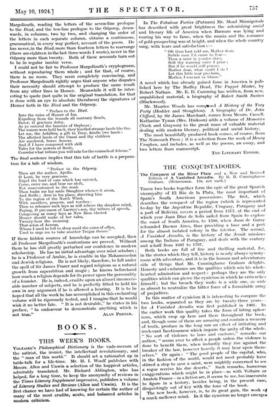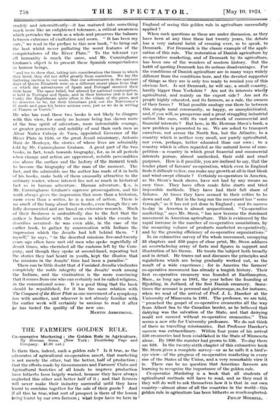'TIE CONQUISTADORES.
The Conquest of the River Plate and a New and Revised Edition of A Vanished Arcadia. By R. B. Cunninghame Craham. (Heinemann. 15s. net each.) TIIESE two books together form the epic of the great Spanish viceroyalty of El Rio de la Plata, the most important of Spain's South American possessions. The first, which describes the conquest of the region (which is represented to-day by the Argentine Republic, Uruguay, Paraguay and a part of Bolivia), covers a period from 1515, at the end of which year Juan Diaz de Solis sailed from Spain to explore the coast of South America, to 1580, when Juan de Gamy refounded Buenos Aires, thus providing a base and a port for the almost isolated colony in the interior. The second, A Vanished Arcadia, is the history of the Jesuit missions among the Indians of Paraguay, and deals with the century and a-half from 1607 to 1767.
Both books are full of fine and thrilling material, for, in the stories which they tell, history is nearly always synony- mous with adventure, and it is in the human and adventurous side of things that Mr. Cunninghame Graham delights. Honesty and endurance are the qualities which win his whole- hearted admiration and respect perhaps they are the only qualities which can pierce the cynicism in which he entrenches himself ; but the breach they make is a wide one, so wide as almost to neutralize the bitter force of a formidable array of prejudices.
In this matter of cynicism it is interesting to compare the two books, separated as they arc by twenty-three years-- for A Vanished Arcadia was first published in 1901. In the earlier work this quality takes the form of biting aphor- isms, which crop up here and there throughout the book, and, though some of them are amusing and contain a measure of truth, prOduce in the long run an effect of irritating and irrelevant facetiousness which impairs the unity of the whole. " No sort of violence to laws and customs," remarks our author, " seems ever to affect a people unless the violence is done to benefit them, when instantly they rise against the breaker of the law, however heavily it may bear upon them- selves." Or again : " The good people of the capital, who, in the fashion of the world, would not most probably have stirred a step to save a saint, were mightily concerned to see a rogue receive his due deserts." Such remarks, humorous exaggerations which might be in place—as with Voltaire or Anatole France—in a fiction are, it seems to me, too inaccurate to figure in a history, besides being, in the present case, disquietingly out of key with the tone of the book.
The new book, however, is, to its great gain, the work of a much mellower mind. In it the cynicism no longer emerges crudely and intermittently—it has matured into something much more like an enlightened tolerance, a critical awareness which pervades the work as a whole and preserves the balance between extremes of exaltation and scorn. " It has been my care," we read in the preface to this new book, " to bring out the best whilst never palliating the worst features of the conquistadores of the River Plate." To the tolerant eye all humanity is much the same, and Mr. Cunninghame Graham's object is to present these Spanish conquistadores us human beings,
" and try to show that, taking into consideration the times in which they lived, they did not differ greatly from ourselves. We lay the flattering unction to our souls, that our adventurers in the spacious days of Queen Elizabeth were on a different moral plane from that on which the adventurers of Spain and Portugal strutted their little hour. The same belief, but altered for national consumption, is held in Portugal and Spain, and in their histories (tell it not in Cath) the Englishman quite often is the villain of the piece, and ho deserves to be, for their historians pick out the Northerner's ill deeds and pass his better actions over, just as we do in writing of Pizarro or Cortes."
He who has read these two books is not likely to disagree with this view, for surely no human being has shown more of the true spirit of adventure, more indomitable courage, or greater generosity and nobility of soul than such men as Alvar Nuilez Cabeea de Vacs, appointed Governor of the River Plate in 1540, or the great Jesuit missionary, Antonio Ruiz de Montoya, the stories of whose lives are admirably
told by Mr. Cunninghame Graham. A great part of the two books, in fact, tends towards biography, for, as in all periods when change and action are uppermost, notable personalities rise above the surface and the history of the moment tends
to become the biography of the man of the moment. The fact, and the admirable use the author has made of it in both 'of his books, make both of them unusually attractive to the ordinary reader, whose interest lies not so much in historical fact as in human adventure. Human adventure, t o, is Mr. Cunninghame Graham's supreme preoccupation, and his work always gives the impression that more than a historian, more even than a writer, he is a man of action. There is no smell of the lamp about these books, even though they are fully documented and are based on extensive research. Much of their freshness is undoubtedly due to the fact that the author is familiar with the scenes in 'which the events he describes occurred—he was even able, in the case of the earlier book, to gather by conversation with Indians the impression which the Jesuits had left behind them. " I myself," he says, " in the deserted missions five-and-twenty years ago often have met old men who spoke regretfully of Jesuit times, who cherished all the customs left by the Com- pany, and though they spoke at second-hand, repeating but the stories they had heard in youth, kept the illusion that the missions in the Jesuits' time had been a paradise."
There can be little doubt that A Vanished Arcadia vindicates completely the noble integrity of the Jesuits' work among
the Indians, and the vindication is the more convincing that it comes from one who can certainly not be called religious, in the conventional sense. It is a good thing that the book should be republished, for it has the same relation with
The Conquest of the River Plate as one movement of a symphony
has with another, and whoever is not already familiar with the earlier work will certainly be anxious to read it after he has tasted the quality of the new one.
MARTIN ARMSTRONG.







































 Previous page
Previous page